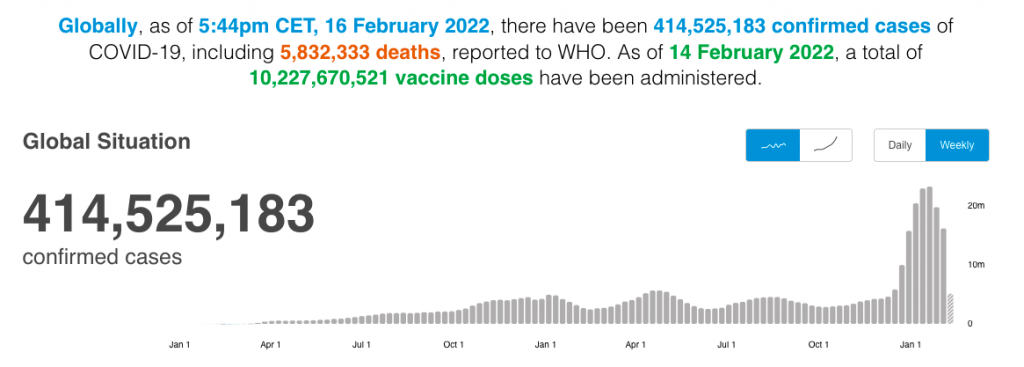The science hasn't changed but the politics have, and policymakers are responding appropriately. Transmission of the coronavirus during the Omicron wave remains at an all-time high, although infections are decreasing globally.

Denmark removed almost all pandemic restrictions on February 1 with the declaration that COVID-19 is no longer a "socially critical disease," the Danish vernacular for endemicity. Yet it continues to lead the world in the average daily rate of new infections: 736 cases per 100,000 people on February 16, according to The New York Times global tracker, down 7% from February 12 (see recent post).
Denmark is not alone, reports Fergal O'Brien, editor of Bloomberg Prognosis, with correspondents Tim Loh and James Paton on Feb. 11.
Governments are racing to scrap the last remaining pandemic measures, eager to reset the world after two years of dramatic upheaval. Even slow-mover Germany is planning to unwind curbs next week, despite setting records for infections on a daily basis.
Germany has the world's second-highest average new daily infections, over 156,000, followed by France with 136,00 and the U.S. with just over 130,000 on February 15. Russia is #1 with nearly 190,000, according to the Times tracker.
U.K. Prime Minister Boris Johnson accelerated easing plans this week, announcing that England’s final curbs would end later in February. Norway and Denmark have already ditched most restrictions. In South Africa, where the omicron variant was first identified before spreading at light speed around the world, self-isolation rules have been scrapped.
Too early?
Scientists and public health experts question the rush, particularly when transmission, while dropping nearly 40% in the last two weeks to 2 million average daily new cases on Feb. 16, according to the Times tracker, is still higher than during any of the prior surges or waves. Average daily deaths appear to have peaked at 11,000 on Feb. 9.

"Soumya Swaminathan, chief scientist at the World Health Organization, says it’s 'foolish' now to drop all precautions, add O'Brien, Loh and Paton. In a separate piece for Bloomberg, Swaminathan discusses the politicization of science and the challenge of educating people about public health: "Among public-health experts, there’s concern that politicians have missed the lessons from the crisis, particularly the on again-off again curbs, and will be caught flatfooted if and when a relapse hits."
Science hasn't changed, but politics has
Scott Gottlieb, a former FDA commissioner under President Trump and author of "Uncontrolled Spread," explained what's changed during an appearance on CBS's Face the Nation last Sunday (February 13). Italics added:
[W]e're clearly shifting from a compact where there was a shared sense of sacrifice across the population generally to take certain measures to take certain mitigation, like wearing masks, like protecting congregate settings towards one where policymakers are clearly shifting the burden onto individuals to try to protect themselves based on their own measure of their risk and the risk of their environment.
Planetizen has a tag for what Gottlieb describes: Public Health vs. Individual Rights (or Responsibility). In an endemic, the latter wins.
Related in Planetizen:
- Danish Paradox: High COVID Transmission Leads to Endemicity, February 14, 2022
- CDC Not Yet On Board with Ending Masking Requirements (blue states end mask mandates), February 13, 2022
FULL STORY: The Era of Pandemic Restrictions Is Fast Coming to an End

Maui's Vacation Rental Debate Turns Ugly
Verbal attacks, misinformation campaigns and fistfights plague a high-stakes debate to convert thousands of vacation rentals into long-term housing.

Planetizen Federal Action Tracker
A weekly monitor of how Trump’s orders and actions are impacting planners and planning in America.

In Urban Planning, AI Prompting Could be the New Design Thinking
Creativity has long been key to great urban design. What if we see AI as our new creative partner?

Baker Creek Pavilion: Blending Nature and Architecture in Knoxville
Knoxville’s urban wilderness planning initiative unveils the "Baker Creek Pavilion" to increase the city's access to green spaces.

Pedestrian Deaths Drop, Remain Twice as High as in 2009
Fatalities declined by 4 percent in 2024, but the U.S. is still nowhere close to ‘Vision Zero.’

King County Supportive Housing Program Offers Hope for Unhoused Residents
The county is taking a ‘Housing First’ approach that prioritizes getting people into housing, then offering wraparound supportive services.
Urban Design for Planners 1: Software Tools
This six-course series explores essential urban design concepts using open source software and equips planners with the tools they need to participate fully in the urban design process.
Planning for Universal Design
Learn the tools for implementing Universal Design in planning regulations.
planning NEXT
Appalachian Highlands Housing Partners
Mpact (founded as Rail~Volution)
City of Camden Redevelopment Agency
City of Astoria
City of Portland
City of Laramie




























